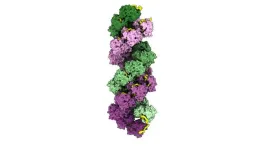(Press-News.org) MSU has a satellite uplink/LTN TV studio and Comrex line for radio interviews upon request.
EAST LANSING, Mich. – The COVID-19 pandemic adversely impacted K-12 education and its effects have been well documented. However, there has been less focus on how the pandemic affected the special education system and, specifically, that system here in Michigan.
To provide more insight and data, researchers at Michigan State University’s College of Education published a new study exploring learning gaps for students with disabilities and especially for those who are Black, Asian, and economically disadvantaged students — with the 2019-21 school years showing staggering declines in identifying students who could benefit from special education.
Declines in special education identification during remote learning
The study, published in Educational Evaluation and Policy Analysis, examined the number of students who were identified by school specialists as needing special education services from a sample size of over 2.9 million Michigan students from 2012 to 2023.
During the 2019-20 and 2020-21 school years, identifications fell by a staggering 19% and 12%, respectively. Specific learning disabilities — brain-based disorders that affect a person’s ability to understand or use language, read, write, or do math — were the most impacted. Economically disadvantaged students and students from underrepresented backgrounds, particularly Black and Asian students, experienced disproportionately larger declines in special education services.
According to Associate Professor Adrea Truckenmiller, one of the researchers on the study, “Even before the pandemic, our evaluation processes for specific learning disabilities were difficult for schools with strained resources to implement and were not sensitive enough to detect specific learning disabilities before grades 3 through 5. These data from the pandemic show how events can exacerbate already vulnerable systems.”
The study attributes the disruption in special education identification to the challenges in providing pre-referral intervention and other required evaluation procedures during remote learning across most of the state’s public-school districts.
Identification rates returned to pre-pandemic trends during the 2021-22 school year and saw continued growth into 2022-23. However, the sharp decline in identifications from 2019-21 could have long-lasting implications.
Why in-person learning matters
The research suggests that districts with fully remote learning had the steepest declines in special education identification. This trend appeared less severe in hybrid and fully in-person settings, highlighting the importance of physical classroom interactions in identifying and supporting students with disabilities.
The scholars also addressed the complex process schools must follow to identify specific learning disabilities, which involved weeks of targeted interventions, detailed data collection, and strict criteria to ensure accurate diagnoses.
“There is a lot of evidence suggesting that the earlier a student is identified and receives support, the better the long-term outcomes are,” said Matthew Guzman, the study’s second author and fourth-year doctoral student in the Education Policy program. “Missing that window could have lasting negative effects, which is why it is so important to address these gaps now.”
Providing early intervention in grades K-3 can help close the achievement gap between students with and without disabilities. It also reduces the need for intensive instruction outside the general classroom, allowing more students with disabilities to stay fully included in general education.
Other researchers on the study included Marisa Fisher, associate professor in the Department of Counseling, Educational Psychology and Special Education; Scott Imberman, professor in the Department of Economics and in the Education Policy doctoral program; Katharine Strunk, former director of the Education Policy Innovation Collaborative, or EPIC; and Bryant Hopkins, former postdoctoral researcher at EPIC.
The scholars hope the study will inform future policy on improving early identification processes, addressing disparities in special education services and ensuring equitable support for students with disabilities, especially during times when resources are stretched thin.
By Marco Schimizzi
Read on MSUToday.
###
Michigan State University has been advancing the common good with uncommon will for more than 165 years. One of the world’s leading public research universities, MSU pushes the boundaries of discovery to make a better, safer, healthier world for all while providing life-changing opportunities to a diverse and inclusive academic community through more than 400 programs of study in 17 degree-granting colleges.
For MSU news on the web, go to MSUToday or x.com/MSUnews
END
MSU study highlights negative impact of COVID-19 pandemic on special education students in Michigan
2024-12-16
ELSE PRESS RELEASES FROM THIS DATE:
VCU secures $9 million grant to establish Cancer Control Equity Research Center in Virginia
2024-12-16
Virginia Commonwealth University (VCU) has been awarded a five-year, $9 million grant from the National Cancer Institute to establish a pioneering Cancer Control Equity Research Center. This initiative aims to enhance the dissemination and implementation of health promotion and cancer prevention services for individuals and families residing in Virginia's Housing and Urban Development (HUD)-administered income-based housing communities in the Greater Richmond region and Hampton Roads.
Adults in under-resourced communities are placed at disproportionate risk for cancer, facing a higher incidence of the disease ...
AgriLife Research leads collaboration to address zebra chip disease
2024-12-16
Texas A&M AgriLife Research scientists are working on a new research project to fight plant diseases transmitted by psyllid insects — particularly the zebra chip disease, which has impacted potato production for decades.
Funded by a $682,500 grant from the U.S. Department of Agriculture National Institute of Food and Agriculture, this three-year project will investigate the mechanisms through which the bacterial pathogen Candidatus Liberibacter solanacearum affects plant and insect immune systems, leading to agricultural losses.
The findings by researchers in the Texas A&M College of Agriculture and Life Sciences could ...
New drug shows promise against Duchenne muscular dystrophy
2024-12-16
A novel drug holds promise for treating Duchenne muscular dystrophy (DMD), a rare genetic disorder that causes severe muscle degeneration.
McGill University researchers have discovered that an experimental compound called K884 can boost the natural repair abilities of muscle stem cells. Current treatments can slow muscle damage, but don’t address the root problem.
DMD affects about one in 5,000 boys worldwide, often leading to wheelchair dependence by the teenage years and life-threatening complications ...
Influenza virus genome: finally discovered in its coat
2024-12-16
To fight the virus that causes influenza, one of the avenues being explored by scientists is the development of drugs capable of destabilising its genome, made up of eight RNA1 molecules. But the challenge is daunting: each RNA molecule is tightly bound to an assembly of proteins which creates a double helix, forming a protective coat that is difficult to manipulate.
For the first time, however, the structure of this protective mantle and its interactions with the virus' RNA have been described on an atomic scale by scientists from the CNRS2 ...
AASM advocates for permanent sleep telehealth services to enhance patient care nationwide
2024-12-16
DARIEN, IL — The American Academy of Sleep Medicine has issued a new position statement advocating for permanent telehealth coverage, emphasizing its essential role in providing high-quality, patient-centered care for individuals with sleep disorders.
The position statement, published as an accepted paper in the Journal of Clinical Sleep Medicine, comes at a crucial turning point as current telehealth flexibilities implemented by the Centers for Medicare and Medicaid Services in response to the COVID-19 public health emergency are set to expire this month. The AASM emphasizes that permanent coverage with adequate reimbursement is vital for the ...
Staphylococcus aureus thwarts vaccines by turning on a protein that halts immune response
2024-12-16
Staphylococcus aureus (S. aureus) is a major cause of skin and soft tissue infections that can sometimes lead to sepsis and toxic shock syndrome. The microbe poses a significant threat to public health, made worse by the spread of methicillin-resistant Staphylococcus aureus bacteria (MRSA) in recent years. According to The Lancet, S. aureus was associated with more than one million deaths around the globe in 2019.
“It is a pathogen in dire need of control because it causes significant morbidity and mortality not just in the United States, but worldwide,” ...
Wedel studying how transnational networks shape non-Western offshore spaces
2024-12-16
Wedel Studying How Transnational Networks Shape Non-Western Offshore Spaces
Janine Wedel, Distinguished University Professor, Schar School of Policy and Government, received money for a project on the growing non-Western offshore system used by transnational networks emanating from autocratic regimes such as Russia to skirt international checks and balances. Wedel and her colleagues are investigating these informal networks and how they enable “weaponized corruption” — the use of corruption for geopolitical ends — and the evasion of Western sanctions. They are ...
Costa and Matsumoto receive funding for hypothesis evaluation and reasoning assistant
2024-12-16
Paulo Costa, Director, C5I Center; Dept. Chair Cyber Security Engineering, College of Engineering and Computing (CEC), and Shou Matsumoto, Research Assistant Professor, C5I Center, CEC, received funding for the project: “HERA: Hypothesis Evaluation and Reasoning Assistant.”
Costa and Matsumoto are developing an explainable artificial intelligence (AI) methodology for hypothesis management and an architecture for the proposed solution. They are also supporting Interactive Aptitude, LLC, in defining use cases in one or more domains and identifying data requirements to support hypothesis management. The Mason/Interactive Aptitude team's solution ...
New research about drought impacts on wildlife can inform conservation strategies
2024-12-16
FORT COLLINS, Colo., December 11, 2024 — People around the world are dealing with drought, so it’s not shocking that it affects wildlife, too: lack of moisture contributes to habitat loss, affects how animals compete for resources, and leads to dehydration and heat stress. The surprising part? The extreme degree to which many animals may need to adapt.
New research predicts that many wildlife species in the continental United States will experience year-long droughts nearly five times as often in the coming decades (2050-2080) than they did historically (1950-2005). In an even more dramatic turn of events, three-year droughts ...
Elucidating the neural mechanisms of stress-induced cardiovascular responses
2024-12-16
Tsukuba, Japan—Under stress, animals change their behavior, such as through "fight or flight" or "freezing" response. Simultaneously, physiological responses essential for stress adaptation are triggered in the body. Cardiovascular regulation, including changes in blood pressure and heart rate, is a critical stress response.
Researchers have focused on the lateral habenula, a brain region where neurons are activated in response to stress. They investigated the neural mechanisms underlying cardiovascular responses by activating ...


